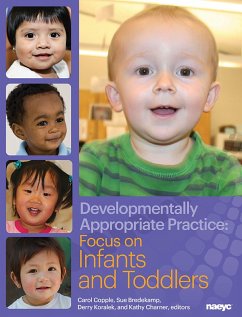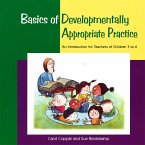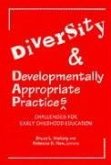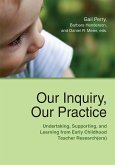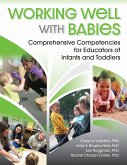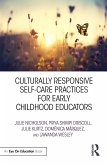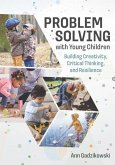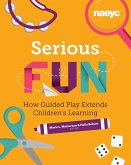Developmentally Appropriate Practice
Focus on Infants and Toddlers
Herausgeber: Copple, Carol; Koralek, Derry; Bredekamp, Sue
Developmentally Appropriate Practice
Focus on Infants and Toddlers
Herausgeber: Copple, Carol; Koralek, Derry; Bredekamp, Sue
- Broschiertes Buch
- Merkliste
- Auf die Merkliste
- Bewerten Bewerten
- Teilen
- Produkt teilen
- Produkterinnerung
- Produkterinnerung
Teachers of infants and toddlers can use this resource to learn about developmentally appropriate practice (DAP) so they can apply DAP in their work with infants and toddlers. Filled with information, practical ideas, and inspiration, this is a book that every infant and toddler teacher will want.
Andere Kunden interessierten sich auch für
![Basics of Developmentally Appropriate Practice Basics of Developmentally Appropriate Practice]() Carol CoppleBasics of Developmentally Appropriate Practice25,99 €
Carol CoppleBasics of Developmentally Appropriate Practice25,99 €![Diversity and Developmentally Appropriate Practices Diversity and Developmentally Appropriate Practices]() Diversity and Developmentally Appropriate Practices25,99 €
Diversity and Developmentally Appropriate Practices25,99 €![Our Inquiry, Our Practice Our Inquiry, Our Practice]() Daniel R MeierOur Inquiry, Our Practice27,99 €
Daniel R MeierOur Inquiry, Our Practice27,99 €![Working Well with Babies: Comprehensive Competencies for Educators of Infants and Toddlers Working Well with Babies: Comprehensive Competencies for Educators of Infants and Toddlers]() Claire D. VallottonWorking Well with Babies: Comprehensive Competencies for Educators of Infants and Toddlers46,99 €
Claire D. VallottonWorking Well with Babies: Comprehensive Competencies for Educators of Infants and Toddlers46,99 €![Culturally Responsive Self-Care Practices for Early Childhood Educators Culturally Responsive Self-Care Practices for Early Childhood Educators]() Julie NicholsonCulturally Responsive Self-Care Practices for Early Childhood Educators47,99 €
Julie NicholsonCulturally Responsive Self-Care Practices for Early Childhood Educators47,99 €![Problem Solving with Young Children Problem Solving with Young Children]() Ann GadzikowskiProblem Solving with Young Children31,99 €
Ann GadzikowskiProblem Solving with Young Children31,99 €![Serious Fun Serious Fun]() Serious Fun30,99 €
Serious Fun30,99 €-
-
-
Teachers of infants and toddlers can use this resource to learn about developmentally appropriate practice (DAP) so they can apply DAP in their work with infants and toddlers. Filled with information, practical ideas, and inspiration, this is a book that every infant and toddler teacher will want.
Hinweis: Dieser Artikel kann nur an eine deutsche Lieferadresse ausgeliefert werden.
Hinweis: Dieser Artikel kann nur an eine deutsche Lieferadresse ausgeliefert werden.
Produktdetails
- Produktdetails
- Verlag: National Association for the Education of Young Children
- Seitenzahl: 168
- Erscheinungstermin: 1. Juni 2013
- Englisch
- Abmessung: 277mm x 213mm x 13mm
- Gewicht: 562g
- ISBN-13: 9781928896951
- ISBN-10: 1928896952
- Artikelnr.: 49340008
- Herstellerkennzeichnung
- Libri GmbH
- Europaallee 1
- 36244 Bad Hersfeld
- gpsr@libri.de
- Verlag: National Association for the Education of Young Children
- Seitenzahl: 168
- Erscheinungstermin: 1. Juni 2013
- Englisch
- Abmessung: 277mm x 213mm x 13mm
- Gewicht: 562g
- ISBN-13: 9781928896951
- ISBN-10: 1928896952
- Artikelnr.: 49340008
- Herstellerkennzeichnung
- Libri GmbH
- Europaallee 1
- 36244 Bad Hersfeld
- gpsr@libri.de
Carol Copple is a highly respected early childhood education author, educator, and consultant. For 16 years she served as a senior staff member at NAEYC, and her responsibilities included directing the books program. She has taught at Louisiana State University and the New School for Social Research, and she codeveloped and directed a research-based model for preschool education at the Educational Testing Service. With Sue Bredekamp, Carol is coeditor of Developmentally Appropriate Practice in Early Childhood Programs (1997; 2009). Among her other books are Learning to Read and Write: Developmentally Appropriate Practices for Young Children (NAEYC); Growing Minds: Building Strong Cognitive Foundations in Early Childhood (NAEYC); and Educating the Young Thinker: Classroom Strategies for Cognitive Growth (Lawrence Erlbaum). She received her doctorate from Cornell University. Sue Bredekamp is an early childhood education specialist from Washington, DC. She serves as a consultant on developmentally appropriate practice, curriculum, teaching, and professional development for many state and national organizations, including NAEYC, the Council for Professional Recognition, Head Start, and Sesame Workshop. From 1981 to 1998, she was director of accreditation and professional development for NAEYC. Sue is the primary author of the 1987 edition of Developmentally Appropriate Practice in Early Childhood Programs, and coeditor (with Carol Copple) of the 1997 and 2009 revisions. She is the author of the introductory textbook Effective Practices in Early Childhood Education: Building a Foundation, 2nd Edition (Pearson). Sue was a member of the National Research Council’s Committee on Early Childhood Mathematics, and she holds a PhD in curriculum and instruction from the University of Maryland. Derry Koralek, chief publishing officer of NAEYC, oversees the development of all print and digital publishing, including books, brochures, periodicals, professional development guides, posters, and websites for educators and families. Derry is editor in chief of Young Children and TYC—Teaching Young Children. Kathy Charner is editor in chief of NAEYC’s Books and Related Resources department, with responsibility for the content, management, publication, and general excellence of the books and brochures published by NAEYC. Before joining NAEYC, Kathy was editor in chief at Gryphon House for more than 20 years.
1. About the Editors
2. Acknowledgments
3. Editors' Preface
4. 1. What Is Developmentally Appropriate Practice?
5. Key Messages of the Position Statement
6. Core Considerations of Developmentally Appropriate Practice
7. Principles of Child Development and Learning
8. 2. To Be an Excellent Teacher
9. Excellence in All Areas of Practice
10. Seeing the Bigger Picture
11. 3. Understanding Development of Infants and Toddlers
12. Understanding Infants and Toddlers
13. Knowledge of Child Development
14. Philosophy and Principles Supporting Development
15. Understanding Changes in the First Three Years
16. Observing Development From Birth to 3
17. Physical Growth and Development of Habits for Lifetime Wellness and Safe
Living
18. Thinking, Reasoning, and Understanding the World: The Brain and Cognitive
Development
19. The Mind-Body Connection: Development of Sensorimotor Integration
20. Motor Development
21. Being and Belonging: Social and Emotional Development
22. Sense of Self and Others
23. Communication: Development of Language, Literacy, and Mathematical
Understanding
24. Early Literacy and Numeracy
25. 4. Developmentally Appropriate Examples to Consider
26. INFANTS
27. Relationship Between Caregiver and Child
28. Environment.
29. Exploration and Play
30. Routines
31. Reciprocal Relationships With Families
32. Policies
33. TODDLERS
34. Relationship Between Caregiver and Child
35. Environment
36. Exploration and Play
37. Scheduling
38. Routines
39. Reciprocal Relationships With Families
40. Policies
41. 5. FAQs About Developmentally Appropriate Practice
42. 6. Young Children Articles
43. Keys to Quality Infant Care: Nurturing Every Baby's Life Journey
44. Rituals and Routines: Supporting Infants and Toddlers and Their Families
45. Enhancing Practice With Infants and Toddlers From Diverse Language and
Cultural Backgrounds
46. Learning to Be Me While Coming to Understand We: Encouraging Prosocial
Babies in Group Settings
47. What Do We Mean by Reading Readiness?
48. Using Toys to Support Infant-Toddler Learning and Development
49. Why Do Babies Like Boxes Best?
50. Let's Get Messy! Exploring Sensory and Art Activities
51. With Infants and Toddlers
52. More, All Gone, Empty, Full: Math Talk Every Day in Every Way
53. References
2. Acknowledgments
3. Editors' Preface
4. 1. What Is Developmentally Appropriate Practice?
5. Key Messages of the Position Statement
6. Core Considerations of Developmentally Appropriate Practice
7. Principles of Child Development and Learning
8. 2. To Be an Excellent Teacher
9. Excellence in All Areas of Practice
10. Seeing the Bigger Picture
11. 3. Understanding Development of Infants and Toddlers
12. Understanding Infants and Toddlers
13. Knowledge of Child Development
14. Philosophy and Principles Supporting Development
15. Understanding Changes in the First Three Years
16. Observing Development From Birth to 3
17. Physical Growth and Development of Habits for Lifetime Wellness and Safe
Living
18. Thinking, Reasoning, and Understanding the World: The Brain and Cognitive
Development
19. The Mind-Body Connection: Development of Sensorimotor Integration
20. Motor Development
21. Being and Belonging: Social and Emotional Development
22. Sense of Self and Others
23. Communication: Development of Language, Literacy, and Mathematical
Understanding
24. Early Literacy and Numeracy
25. 4. Developmentally Appropriate Examples to Consider
26. INFANTS
27. Relationship Between Caregiver and Child
28. Environment.
29. Exploration and Play
30. Routines
31. Reciprocal Relationships With Families
32. Policies
33. TODDLERS
34. Relationship Between Caregiver and Child
35. Environment
36. Exploration and Play
37. Scheduling
38. Routines
39. Reciprocal Relationships With Families
40. Policies
41. 5. FAQs About Developmentally Appropriate Practice
42. 6. Young Children Articles
43. Keys to Quality Infant Care: Nurturing Every Baby's Life Journey
44. Rituals and Routines: Supporting Infants and Toddlers and Their Families
45. Enhancing Practice With Infants and Toddlers From Diverse Language and
Cultural Backgrounds
46. Learning to Be Me While Coming to Understand We: Encouraging Prosocial
Babies in Group Settings
47. What Do We Mean by Reading Readiness?
48. Using Toys to Support Infant-Toddler Learning and Development
49. Why Do Babies Like Boxes Best?
50. Let's Get Messy! Exploring Sensory and Art Activities
51. With Infants and Toddlers
52. More, All Gone, Empty, Full: Math Talk Every Day in Every Way
53. References
1. About the Editors
2. Acknowledgments
3. Editors' Preface
4. 1. What Is Developmentally Appropriate Practice?
5. Key Messages of the Position Statement
6. Core Considerations of Developmentally Appropriate Practice
7. Principles of Child Development and Learning
8. 2. To Be an Excellent Teacher
9. Excellence in All Areas of Practice
10. Seeing the Bigger Picture
11. 3. Understanding Development of Infants and Toddlers
12. Understanding Infants and Toddlers
13. Knowledge of Child Development
14. Philosophy and Principles Supporting Development
15. Understanding Changes in the First Three Years
16. Observing Development From Birth to 3
17. Physical Growth and Development of Habits for Lifetime Wellness and Safe
Living
18. Thinking, Reasoning, and Understanding the World: The Brain and Cognitive
Development
19. The Mind-Body Connection: Development of Sensorimotor Integration
20. Motor Development
21. Being and Belonging: Social and Emotional Development
22. Sense of Self and Others
23. Communication: Development of Language, Literacy, and Mathematical
Understanding
24. Early Literacy and Numeracy
25. 4. Developmentally Appropriate Examples to Consider
26. INFANTS
27. Relationship Between Caregiver and Child
28. Environment.
29. Exploration and Play
30. Routines
31. Reciprocal Relationships With Families
32. Policies
33. TODDLERS
34. Relationship Between Caregiver and Child
35. Environment
36. Exploration and Play
37. Scheduling
38. Routines
39. Reciprocal Relationships With Families
40. Policies
41. 5. FAQs About Developmentally Appropriate Practice
42. 6. Young Children Articles
43. Keys to Quality Infant Care: Nurturing Every Baby's Life Journey
44. Rituals and Routines: Supporting Infants and Toddlers and Their Families
45. Enhancing Practice With Infants and Toddlers From Diverse Language and
Cultural Backgrounds
46. Learning to Be Me While Coming to Understand We: Encouraging Prosocial
Babies in Group Settings
47. What Do We Mean by Reading Readiness?
48. Using Toys to Support Infant-Toddler Learning and Development
49. Why Do Babies Like Boxes Best?
50. Let's Get Messy! Exploring Sensory and Art Activities
51. With Infants and Toddlers
52. More, All Gone, Empty, Full: Math Talk Every Day in Every Way
53. References
2. Acknowledgments
3. Editors' Preface
4. 1. What Is Developmentally Appropriate Practice?
5. Key Messages of the Position Statement
6. Core Considerations of Developmentally Appropriate Practice
7. Principles of Child Development and Learning
8. 2. To Be an Excellent Teacher
9. Excellence in All Areas of Practice
10. Seeing the Bigger Picture
11. 3. Understanding Development of Infants and Toddlers
12. Understanding Infants and Toddlers
13. Knowledge of Child Development
14. Philosophy and Principles Supporting Development
15. Understanding Changes in the First Three Years
16. Observing Development From Birth to 3
17. Physical Growth and Development of Habits for Lifetime Wellness and Safe
Living
18. Thinking, Reasoning, and Understanding the World: The Brain and Cognitive
Development
19. The Mind-Body Connection: Development of Sensorimotor Integration
20. Motor Development
21. Being and Belonging: Social and Emotional Development
22. Sense of Self and Others
23. Communication: Development of Language, Literacy, and Mathematical
Understanding
24. Early Literacy and Numeracy
25. 4. Developmentally Appropriate Examples to Consider
26. INFANTS
27. Relationship Between Caregiver and Child
28. Environment.
29. Exploration and Play
30. Routines
31. Reciprocal Relationships With Families
32. Policies
33. TODDLERS
34. Relationship Between Caregiver and Child
35. Environment
36. Exploration and Play
37. Scheduling
38. Routines
39. Reciprocal Relationships With Families
40. Policies
41. 5. FAQs About Developmentally Appropriate Practice
42. 6. Young Children Articles
43. Keys to Quality Infant Care: Nurturing Every Baby's Life Journey
44. Rituals and Routines: Supporting Infants and Toddlers and Their Families
45. Enhancing Practice With Infants and Toddlers From Diverse Language and
Cultural Backgrounds
46. Learning to Be Me While Coming to Understand We: Encouraging Prosocial
Babies in Group Settings
47. What Do We Mean by Reading Readiness?
48. Using Toys to Support Infant-Toddler Learning and Development
49. Why Do Babies Like Boxes Best?
50. Let's Get Messy! Exploring Sensory and Art Activities
51. With Infants and Toddlers
52. More, All Gone, Empty, Full: Math Talk Every Day in Every Way
53. References

